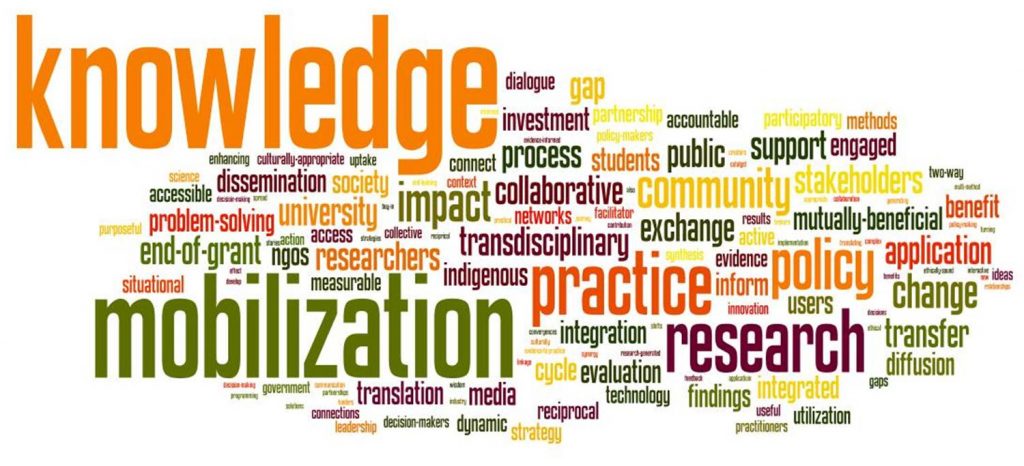
Knowledge translation and exchange (KTE) or knowledge mobilization (KM) consists of a variety of methods in which research and knowledge is transferred, translated, exchanged and co-produced to enhance the practical application of knowledge between researchers and research-users (individuals and community organizations seeking to use research to inform decisions in public policy and professional practice). A key characteristic of community-based research projects is a comprehensive plan for KTE.
Resources from PAN’s Toolkit:
Resources from CIHR:
Guide to Knowledge Translation Planning at CIHR: Integrated and End-of-Grant Approaches (learning module)
Knowledge Translation in Health Care: Moving From Evidence to Practice (series of presentations on the Primer: Knowledge Translation in Health Care)
Integrating Ethics and the Knowledge-to-Action Cycle this cycle illustrates the iterative relationship between knowledge creation and knowledge translation, as well as some of the potential ethical considerations at steps along the way
Knowledge to Action: A End-of-Grant Knowledge Translation Casebook
Articles about KTE:
Community-based knowledge transfer and exchange: Helping community-based organizations link research to action by Michael G Wilson, John N Lavis, Robb Travers, and Sean B. Rourke. This article outlines KTE strategies that can help community organizations use research for advocacy, program planning, and service delivery.
KTE Toolkits and Tools:
Knowledge Translation (KT) page at the Michael Smith Foundation for Health Research (an important funder of research). It provides an overview of KT activities, training events, resources, and publications. Also read their article about the role of health research funders in knowledge translation.
From Research to Practice: A Knowledge Transfer Planning Guide, a practical guide with worksheets to help you develop messages, understand audiences, develop transfer strategies, and evaluate impact. Created by the Institute for Work and Health (2006).
Knowledge Translation Plan Template, a downloadable template that was created to assist scientists in the development of a KT plan. Created by The SickKids Learning Institute.
CES4Health.Info, is a free, online mechanism for peer-reviewing, publishing and disseminating products of health-related community-engaged scholarship that are in forms other than journal articles.
The Essentials of Knowledge Translation: A Fact Sheet: This fact sheet, written by Community, Alliances and Networks, outlines the essentials of knowledge translation and their approach.
Knowledge Mobilization (KMb) Toolkit: This toolkit is from the Knowledge Institute on Child and Youth Mental Health and Addictions. It describes KT and gives a complete toolkit to create, enact, and evaluate a knowledge mobilization plan.
Indigenous Knowledge and KTE:
Knowledge Translation and Indigenous Knowledge by Janet Smylie, Carmel Mary Martin, Nili Kaplan-Myrth, Leah Steele, Caroline Tait, and William Hog (2004). Indigenous ways of generating and translating knowledge at the community level have been increasingly recognized in social science, native studies, and law. This paper explores the authors’ evaluation of the interface between knowledge translation theory and Indigenous knowledge.
Webinars and Podcasts:
Knowledge Mobilization Works podcasts, by Peter Levesque (2013). For those who learn by listening, this series of 19 podcasts highlights the voices and ideas from leading Canadian knowledge brokers.
